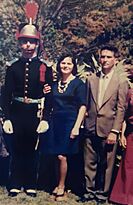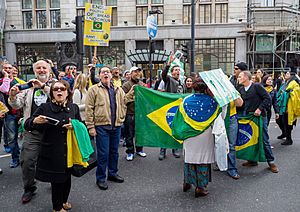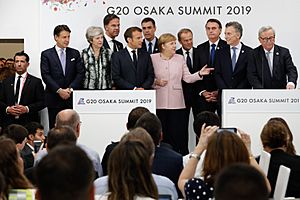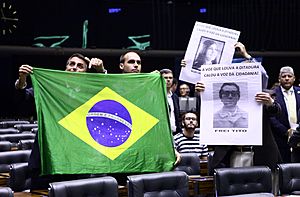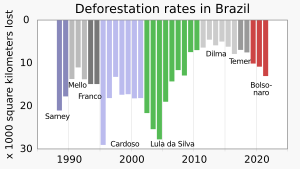Jair Bolsonaro facts for kids
Quick facts for kids
Jair Bolsonaro
|
|
|---|---|
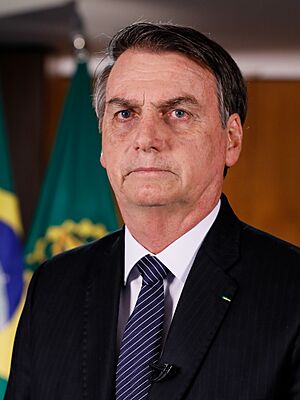
Bolsonaro in 2019
|
|
| 38th President of Brazil | |
| In office 1 January 2019 – 1 January 2023 |
|
| Vice President | Hamilton Mourão |
| Preceded by | Michel Temer |
| Succeeded by | Luiz Inácio Lula da Silva |
| Member of the Chamber of Deputies | |
| In office 1 February 1991 – 1 January 2019 |
|
| Constituency | Rio de Janeiro |
| Councillor of Rio de Janeiro | |
| In office 1 January 1989 – 31 January 1991 |
|
| Constituency | At-large |
| Personal details | |
| Born | 21 March 1955 Glicério, São Paulo, Brazil |
| Political party | PL (since 2021) |
| Other political affiliations |
See list
Independent (2019–2021)
PSL (2018–2019) PSC (2016–2018) PP (2005–2016) PFL (2005) PTB (2003–2005) PP (1995–2003) PPR (1993–1995) PP (1993) PDC (1988–1993) |
| Spouses |
Rogéria Nantes Braga
(m. 1978; div. 1997)Ana Cristina Valle
(m. 1997; div. 2007)Michelle de Paula
(m. 2007) |
| Children | 5, including Flávio, Carlos, and Eduardo |
| Alma mater | Military Academy of Agulhas Negras |
| Awards | |
| Signature |  |
| Military service | |
| Allegiance | Brazil |
| Branch/service | Brazilian Army |
| Years of service | 1973–1988 |
| Rank | Captain |
| Commands |
|
| Criminal status | In prison |
| Conviction(s) |
|
| Criminal penalty | 27 years and 3 months in prison |
|
Date apprehended
|
22 November 2025 |
| Imprisoned at | Federal Police Superintendency Brasília, Federal District |
Jair Messias Bolsonaro (born 21 March 1955) is a Brazilian politician and former army captain who was the 38th president of Brazil from 2019 to 2023. Before becoming president, he was a member of Brazil's Chamber of Deputies, which is part of the country's congress, for 27 years.
Born in São Paulo, Bolsonaro joined the Brazilian Army in 1973. He became known in 1986 for writing an article that criticized the low pay for soldiers. After leaving the army, he was elected to the city council of Rio de Janeiro in 1988 and then to the Chamber of Deputies in 1990. During his time in congress, he became known for his strong conservative views.
In 2018, Bolsonaro ran for president. During his campaign, he survived an assassination attempt. He won the election and became president on 1 January 2019. As president, he focused on Brazil's economy and public safety. Crime rates went down during his first year. His government was criticized for its policies on the Amazon rainforest, which led to more deforestation. His response to the COVID-19 pandemic also received criticism.
Bolsonaro is a politician who causes strong reactions. His supporters praise his conservative ideas, while his critics disagree with his views. In foreign policy, he worked to build closer relationships with countries like Israel and the United States.
In the 2022 election, Bolsonaro lost to Luiz Inácio Lula da Silva. In January 2023, a large group of his supporters stormed government buildings in the capital city, Brasília. Later that year, a court blocked Bolsonaro from running for office again until 2030. He later faced a trial for planning to overturn the 2022 election results. In September 2025, he was found guilty and sentenced to prison.
Contents
Early Life and Family
Jair Messias Bolsonaro was born on 21 March 1955, in Glicério, a town in the state of São Paulo, Brazil. His parents were Percy Geraldo Bolsonaro and Olinda Bonturi. His family has mostly Italian and some German roots.
His great-grandfather, Vittorio Bolzonaro, came to Brazil from Italy when he was a boy. His mother's family also came from Italy. Bolsonaro grew up with his five brothers and sisters in different towns in São Paulo before his family settled in Eldorado.
Military Career
After high school, Bolsonaro joined a prep school for the Brazilian Army in 1973. He later attended the Military Academy of Agulhas Negras, Brazil's main military academy, and graduated in 1977 as an artillery officer. He served in several army groups. His commanding officers said he was "aggressive" and ambitious.
In 1986, he became famous after writing an article for the magazine Veja. In the article, he complained that soldiers were not paid enough. His superiors were not happy, but he gained support from other officers.
A year later, he was accused of planning disruptive protests. A military board found him guilty, but a higher military court later acquitted him. In 1988, he left the army with the rank of captain to start a career in politics.
Early Political Career
City Councilor in Rio de Janeiro (1989–1991)
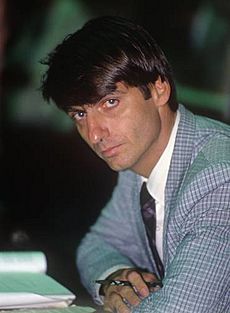
Bolsonaro's political career began in 1988 when he was elected as a city councilor in Rio de Janeiro. He was a member of the Christian Democratic Party. He served for two years and was known for being a quiet and conservative councilor. He mostly focused on issues important to the military, like retirement benefits for former soldiers.
Federal Deputy for Rio de Janeiro (1991–2018)
In 1990, Bolsonaro was elected as a federal deputy to the Chamber of Deputies, which is part of Brazil's national congress. He represented the state of Rio de Janeiro. He was re-elected six times, serving for a total of 27 years. Over the years, he was a member of several different political parties. In the 2014 election, he received more votes than any other candidate in Rio de Janeiro, with 465,000 votes.
During his time in congress, Bolsonaro proposed over 170 bills, and two of them became laws. In 2018, he joined the Social Liberal Party (PSL) to run for president.
2018 Presidential Campaign
On 22 July 2018, the PSL party officially nominated Bolsonaro as their candidate for president. His campaign slogan was "Brazil above everything, God above everyone."
Bolsonaro's campaign focused on several key ideas. He promised to support business and reduce government control over the economy. He also promised to be tough on crime and to support "traditional family values." He said he would lower taxes to help businesses grow and create jobs. His promises to fight crime and corruption were very popular with voters.
After the leading candidate from the Workers' Party, Luiz Inácio Lula da Silva, was unable to run, Bolsonaro became the front-runner in the polls.
In the first round of the election on 7 October 2018, Bolsonaro won the most votes with 46%, but not enough to win outright. He then faced the second-place candidate, Fernando Haddad, in a run-off election on 28 October. Bolsonaro won the second round with 55.13% of the vote and was elected the 38th president of Brazil.
Presidency (2019–2023)
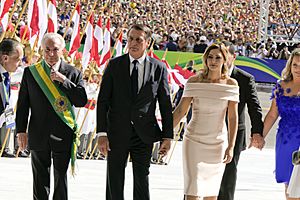
Bolsonaro became president on 1 January 2019. His government, or cabinet, had 22 ministers, including many former army officers in important positions.
In his first year, Bolsonaro focused on Brazil's economy and other issues inside the country. He made changes to the social security system and cut some government spending. He also changed the rules for protecting indigenous lands in the Amazon rainforest, arguing that these groups should be more integrated into Brazilian society. This led to an increase in deforestation, which was criticized by environmental groups.
During the COVID-19 pandemic, Bolsonaro's government was criticized for its response. He often downplayed the seriousness of the virus and opposed lockdown measures. Many people disagreed with his handling of the health crisis.
In foreign policy, Bolsonaro worked to strengthen relationships with the United States under President Donald Trump and with Israel. He also continued to work with other major developing countries in the BRICS group.
By 2021, large protests took place across Brazil against his government's handling of the pandemic. His approval ratings went down as the country faced both a health crisis and economic problems.
Post-Presidency (2023–Present)

After losing the 2022 election, Bolsonaro left Brazil for the United States on 30 December 2022, one day before his term ended. He stayed in Florida for several months.
On 8 January 2023, thousands of his supporters stormed the main government buildings in Brasília, including the Congress, the Supreme Court, and the presidential palace. They were protesting the election result and calling for the military to remove the new president, Lula da Silva. Bolsonaro later posted on Twitter that he did not support the attacks.
Bolsonaro returned to Brazil in March 2023. He said he planned to help his political party prepare for future elections.
Legal Issues and Imprisonment
On 30 June 2023, Brazil's top electoral court barred Bolsonaro from running for public office until 2030. The court ruled that he had misused his power as president to spread false information about the voting system during his campaign.
In 2024, police began investigating a plan by Bolsonaro and his allies to overturn the 2022 election results and stay in power. According to testimony from former military commanders, Bolsonaro presented them with a plan to keep him in power, but they refused to support it.
The trial began in 2025. On 11 September 2025, the Supreme Federal Court found Bolsonaro guilty of planning to overturn the election and sentenced him to 27 years and 3 months in prison. He was first placed under house arrest. On 22 November 2025, he was arrested and taken to a federal police facility after he tried to remove his electronic ankle monitor. A few days later, the Supreme Court voted to keep him in police custody.
Political Positions
Jair Bolsonaro's political views are described as nationalist and conservative. His supporters often come from the middle and upper classes, as well as from conservative and Christian groups.
He is a strong opponent of left-wing politics. He supports the right of citizens to own guns for self-defense and has worked to loosen Brazil's gun laws. During his presidency, he supported policies that favored businesses and free markets.
Views on the Brazilian Military Dictatorship
Throughout his career, Bolsonaro has often spoken positively about the military dictatorship that ruled Brazil from 1964 to 1985. He has called it a "glorious" period in Brazil's history and said that it brought "20 years of order and progress."
When he voted to impeach former president Dilma Rousseff, he dedicated his vote to Colonel Carlos Alberto Brilhante Ustra, who was a leading figure during the military government.
Foreign Policy
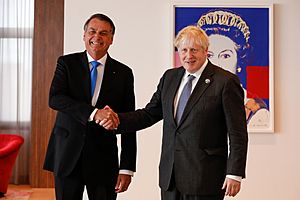
As president, Bolsonaro aimed to change Brazil's foreign policy. He wanted to build stronger relationships with countries like the United States, Israel, and Italy. He was a strong supporter of U.S. President Donald Trump and was often called the "Trump of the Tropics."
He also expressed distrust of China's growing influence in Brazil but continued to trade with the country. He said his goal was to make deals that were good for Brazil without any "ideological agenda."
Environment and Climate Change
Bolsonaro is a strong supporter of Brazil's farming and mining industries. He has often said that the economic development of the Amazon rainforest should be a priority. During his presidency, he weakened environmental protection laws.
These policies led to a sharp increase in deforestation and forest fires in the Amazon. The government's environmental agency reported that deforestation in June 2019 was 88% higher than in June of the previous year. His environmental policies were criticized by many international leaders and organizations.
Personal Life
Bolsonaro has been married three times and has five children. From his first marriage to Rogéria Nantes Braga, he has three sons who are also politicians: Flávio, Carlos, and Eduardo. He has one son, Renan, from his second marriage to Ana Cristina Valle.
In 2007, he married his current wife, Michelle de Paula Firmo Reinaldo. They have one daughter, Laura. As of 2018, Bolsonaro and his family lived in Barra da Tijuca, a neighborhood in Rio de Janeiro.
Images for kids
See also
 In Spanish: Jair Bolsonaro para niños
In Spanish: Jair Bolsonaro para niños


